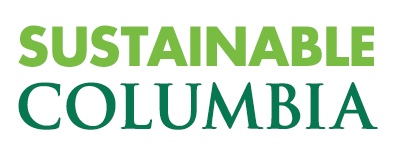Sustainable Event Guidelines
Introduction
All events must comply with government and public health guidance. Please visit Columbia's COVID-19 website for the most current event policy.
Sustainable Columbia will soon begin to provide training and assistance with choosing more sustainable products for events. This guide will provide you with ideas and insights to think about how you might update your event planning procedures to reduce waste, limit single-use plastics, and make more sustainable choices.
Virtual meetings can be more accessible to those not able to travel. Can small meetings be conducted via video conference?
Provide a livestream link (or other remote attendance option) for large, in-person events. This allows guests to opt out of travel.
Utilize online guest registration platforms (e.g. Eventbrite, Bedework, Google Forms, etc), to help assess expected attendance. Assume a 50% attendance rate for the purpose of ordering food, especially for large events that have free registration.
Review your plan for collateral. Can invitations, schedule, programs, and thank you notes be sent electronically and/or published on a website?
Consider the sustainability of the products you choose when printing. Utilize as much of the material as possible by printing double-sided and choose post-consumer recycled paper and soy-based inks for offset printing.
Choose reusable name badges and provide clearly marked drop-off locations near the exits, as many guests now look for opportunities to recycle.
Use event signage that is made from post-consumer, recycled, durable materials, or is recyclable. Design with reusability in mind by excluding dates or including space for inserts with changing details that can be swapped out while the branding remains the same.
When making your venue plan, consider what guests may need to make sustainable choices. For example, provide signage to the nearest bottle filling station rather than encouraging them to purchase bottled beverages at the nearest cafe or use technology such as a portable electronic signage and maps instead of printed ones.
Avoid single-use, plastic, and individually wrapped items (chips, condiments, sugar, salt, etc.). When it is necessary to provide individual servings or meal kits, choose compostable and biodegradable packaging, plates, cups, utensils, and napkins.
When possible, request reusable materials (like china and flatware), linenless tables, and a retrieval service. Serve water and beverages in pitchers, carafes, or jugs. (Refer to the COVID-19 Event Policy for health and safety measures.)
Order Healthy Food in Responsible Quantities
Order food for 40% of the registered guest list to accommodate for attendance drop off and to reduce waste. For example, order enough food for 40 guests for a registration list of 100.
Choose healthy, 75% plant-based, and low impact foods (local, organic, seasonal, Fair Trade, and vegetarian/vegan options). Consult the University’s Healthy Food & Beverage standards for meetings.
When ordering animal products, choose organic, sustainably farmed, antibiotic-free, and cruelty-free.
Arrange for food to be displayed for guests, reducing the size of service areas and replenishing them as needed.
Provide recyclable or compostable to-go containers, and encourage people to bring/use their own.
Donate leftovers in compliance with local restrictions.
Ensure the facility/venue has proper waste receptacles (landfill, recycling, and compost) that are clearly marked and conveniently placed.
Educate guests on how waste items should sorted and discarded. Bring reusable signage, if the facility cannot provide it, illustrating the designated receptacles that accepts the likely refuse guests will have at an event. Download Columbia's signage here.
Offer composting at events where food is served.
Reconsider having giveaways, even the most sustainable choices add to the carbon footprint of the event and could outweigh the benefit.
Give digital swag (e.g. discount codes, e-tickets, online courses), offer photo opportunities, or make in-kind donations to charity.
When buying giveaways:
Opt for durable, functional, reusable items made from organic or recycled material.
Order in bulk and avoid items that are individually wrapped. If they arrive wrapped, unwrap them before the event to make sure the waste is going in the appropriate bin.
Choose local vendors to support local communities and limit shipping.
Get creative with décor:
Use potted plants that can be replanted or maintained instead of fresh cut flowers.
Ask local vendors or schools to donate artwork to use as decoration.
Avoid single-use décor items by excluding dates and store for reuse.
Instead of balloons, consider paper goods that are recyclable (banners, flags, streamers, pom-poms, lanterns, etc.).
Designate a sustainability volunteer or staff member in the room to help guide people to the proper landfill/recycle/compost receptacles.
Inquire if venue staff (kitchen, servers and facilities/cleaning) are trained in waste disposal and food management so leftovers may be eligible for shelter donations or proper composting.
Allow both guests and speakers to participate remotely by offering livestreaming and video conferencing options.
Encourage guests to use public transit rather than personal vehicles by highlighting the options prominently on webpages and communications.
Share the Columbia Transportation shuttle schedule with guests.
Build in carbon offset plan/budget for unavoidable travel.
Inform speakers and attendees that Columbia is committed to reducing event waste and aims for zero-waste events across the University by 2030.
Ask attendees to bring their own reusable containers (beverages and utensils) and provide incentives for those who do.
Provide signage to the nearest bottle filling station.
Save paper and postage! Send invitations electronically instead of using hard copy mailings.
Provide agendas and any pre or post-event materials via email or on an event website.
Use PowerPoint or Google Slides and ask speakers to forego printed materials.
Publicize the event’s zero-waste goal early and widely (invitation, social media, email, etc.). Make an announcement at the beginning of the event and remind people to refer to signage when disposing of waste to ensure the correct receptacle is used.
